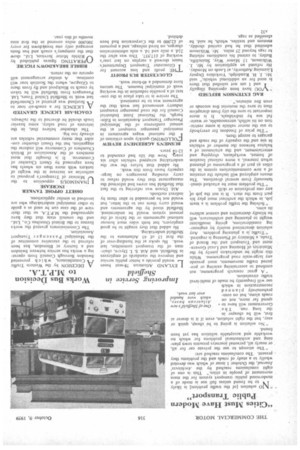"Cities Must Have Modern • Public Transport"
Page 34

If you've noticed an error in this article please click here to report it so we can fix it.
solution [of the traffic problem] is likely
to be found unless full use is made of a modernized public transport system for the mass movement of people in cities." This is one of eight conclusions reached by the Architects' Journal, the October 1 issue of which was devoted wholly to a study of roads and the problems they
• present. The conclusions reached are: "The attempt to use the private car for all, " or nearly all, personal journeys presents town planning and architectural problems for which no workable and acceptable .solution has yet been found.
"No solution is going to be 'cheap, easy, but the right solution, even if it is first, will be cheaper in the long run.
Government will have to spend far more, not on roads alone, but on comprehensively planned reconstruction in which use will frequently be made of multi-level traffic circulation.
"A great research programme, not confined to ascertaining existing or projected traffic movements, must precede any large-scale road programme. While this might be undertaken jointly by the Ministries of Housing and Local Government and Transport and the Board of Trade, a Ministry of Planning is required.
"Traffic is a planning problem. Any solution determined mainly by engineering considerations, giving insufficient weight to planning arid architecture, will be blindly destructive and cannot achieve its aims.
"Solving the traffic problem is a team lob, in which the 'architect must play his part from the start. It is not the job of any one profession or skill.
"The problem must be attacked simultaneously from several directions. The means employed will include the creation of a new communications system in the cities as part of a programme of planned urban renewal, a more rational location of homes, workplaces, shopping and entertainment, and the attainment of a balance between the number of vehicles in Use and the capacity of the roads and garages to accept them.
"The price of freedom for everybody to use the motor vehicle is sonic restriction on it selfish, unreasonable, or wasteful use by individuals. It is more important to save the city from disruption than to save the motorist five seconds or even five minutes."
One of Sheffield's new Atlantean buses, which were handed over last week.




































































































